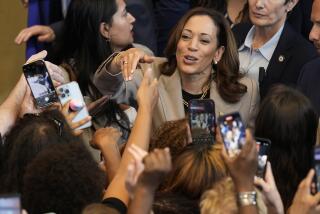Suit Accuses Tobacco Firms of Price-Fixing Conspiracy
- Share via
In a new line of attack against the tobacco industry, cigarette makers Tuesday were accused in a class-action suit of engaging in a long-running scheme to fix cigarette prices in the U.S. and overseas.
The suit was filed in federal court in Washington on behalf of tobacco wholesalers and distributors allegedly harmed by being forced to pay more for cigarettes “than they would have in the absence of the illegal . . . conspiracy,” the complaint says.
Battered tobacco stocks sank further on news of the case, with shares of industry leader Philip Morris Cos. reaching a five-year low.
The charge of conspiring to prop up prices is a new wrinkle in the immense legal assault on “Big Tobacco.” Until now, many anti-tobacco suits, including those filed by the states, have had the stated goal of discouraging smoking by forcing the industry to raise prices to cover heavy legal costs. Indeed, cigarette consumption has dropped nearly 10% in the last year, partly because of price increases stemming from court settlements and higher tobacco taxes.
Industry spokesmen Tuesday derided the case as a moneymaking scheme by plaintiffs lawyers who missed the fee bonanza of the industry’s $246-billion settlement with the states.
Mark Smith, a spokesman for Brown & Williamson Tobacco Corp., the third-largest U.S. cigarette maker, said the suit deserves a grade of “ ‘C’ for creativity and ‘F’ for being frivolous. . . . Tobacco companies are brutally competitive,” he said.
In addition to B&W; and Philip Morris, the 34-page complaint named R.J. Reynolds Tobacco Co., Loews Corp.’s Lorillard Tobacco Co. subsidiary and Liggett Group Inc. A tobacco distributor in Buffalo, N.Y., and another in Bryan, Texas, were named as plaintiffs, but lawyers involved in the case said more wholesalers will be added.
“This is about an industry that for 30 or more years has decided to stick it to the public,” said Jon Ferguson, one of the lawyers. “They’ve got an addictive product . . . and they take advantage of that,” he said.
According to the suit, cigarette makers have conspired since at least 1988 to fix prices in violation of federal antitrust laws, including through the work of the Committee of Counsel, made up of top in-house lawyers for the companies.
The suit says that when a company has announced a price hike, the others typically posted the identical increase within hours or even minutes. To reduce suspicion, the companies “often rotated which defendant would lead the price increase,” the lawsuit states.
Ferguson acknowledged that plaintiffs lack documentary proof of a U.S. price-fixing scheme but said they will seek such evidence by examining company records and deposing witnesses.
However, the complaint quoted documents from British American Tobacco Co., parent of Brown & Williamson, suggesting systematic efforts by the firm to cooperate with Philip Morris in fixing prices and dividing markets in several Latin American countries during the late 1980s and early ‘90s.
Those memos came to light through the state of Washington’s case against the tobacco industry, which was being tried when the industry and states reached their settlement 15 months ago.
Ferguson, then a senior counsel for the Washington attorney general’s office, had culled the Latin American price-fixing memos from a giant depository set up in England to house British-American documents sought by lawyers for the states.
The Washington case had relied heavily on charges of an antitrust scheme, but its thrust was an alleged conspiracy between the companies to refrain from making safer cigarettes. Ferguson, who has since gone into private practice, said Tuesday that the state had considered charging the industry with price fixing, but to do so would have clouded the rationale for the state suits--namely, that higher cigarette prices are good for public health.
Raising prices to follow the lead of a rival manufacturer is common in many businesses and does not prove the existence of a price-fixing scheme. Bonnie Herzog, tobacco analyst at Credit Suisse First Boston, said that when a tobacco company boosts cigarette prices, wholesalers typically apply the increase to all brands. Unless rival manufacturers raise their prices too, wholesalers will pocket the extra profits. “That’s just the way it works,” she said.
Although cigarette consumption has been falling, tobacco companies throughout the years have managed to boost prices well above the rate of inflation. Whereas the suit attributes this to price-fixing, some analysts have attributed it to the addictiveness of tobacco products.
Lawyers involved in the case said additional class actions on behalf of smokers who may have overpaid could be filed in a matter of days.
The industry also faces a massive lawsuit by the U.S. Department of Justice, a class action by Florida smokers that could produce a giant punitive damages award, and claims by individual smokers throughout the country.
Among major tobacco stocks, Philip Morris lost more than 5% of its market value Tuesday, sliding to $19.50, its lowest closing price since January 1995. R.J. Reynolds fell 38 cents to $18.25, Loews slumped $4.19 to $52.81, and American depositary receipts of BAT lost 75 cents to $8.50.
More to Read
Inside the business of entertainment
The Wide Shot brings you news, analysis and insights on everything from streaming wars to production — and what it all means for the future.
You may occasionally receive promotional content from the Los Angeles Times.










